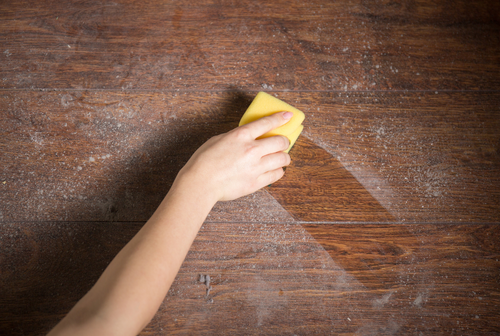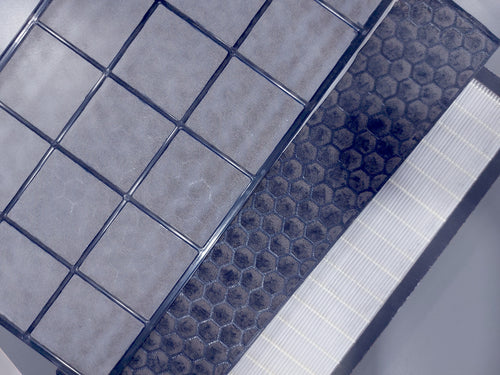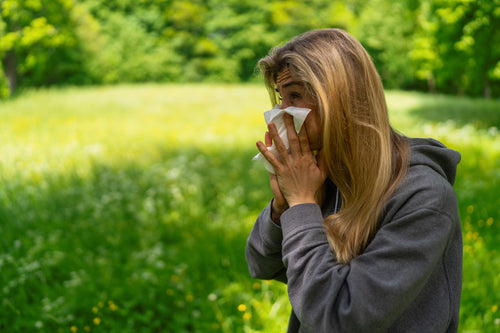Oh, springtime! The earth is reawakening, and so are your pollen and outdoor mold allergies.
Why are allergies so bad in the spring? Everything is in bloom, your geography matters, weather plays a factor, and you can also blame climate change–spring pollination has worsened in the last 20 years.
If you’re wondering if you’re experiencing spring allergies, symptoms include sneezing, congestion, runny nose, watery eyes, and itching in the nose, eyes, or the roof of the mouth.
But don’t despair, with a few easy tips, you can survive the spring allergy season more comfortably. Prioritizing the quality and cleanliness of your indoor air is one of the best ways to fight spring allergies. Shop Air Oasis HEPA-enabled air purifiers to relieve symptoms of spring allergies today.
Check Pollen and Mold Counts
Limit the amount of time you spend outside when pollen and outdoor mold levels are high. Pollen and mold counts can be found on many allergy websites, such as pollen.aaaai.org, and in local weather reports. In general, counts tend to be highest on warm, dry, windy days.
Reduce Allergy Exposure Triggers
People with spring allergies should avoid triggers as much as possible. Because spring allergies are largely caused by tree pollen, you can’t avoid going outside altogether. You can, however, limit the amount of pollen that gets into your eyes, nose, and mouth. Wearing sunglasses in the spring season can help avoid pollen getting stuck in the eyes. Wearing a hat can help shield your face from pollen; in extreme allergy cases, a surgical face mask can prevent you from breathing it in.
Keep Windows and Doors Closed
The air outside is filled with tree pollens and mold spores in early spring. By late spring, grass pollen kicks in, and mold spores increase. Keep these allergens outside by closing the windows and doors in your home and car.
Remove Shoes Before Entering Your Home
Shoes are one of the number one culprits of pollen and mold being tracked into your home. Removing your shoes at the door, and even better–leaving them outside–will significantly reduce the number of allergy triggers that are able to make it inside your home.
Limit Your Time Outdoors
Even as the weather is improving and the flowers are blooming, if you suffer from spring allergies, it’s the season to limit your time outdoors. The most important thing you can do to stop seasonal allergies is to limit your exposure to triggers. At times when tree pollen and ragweed are pervasive in your outdoor environment, this may mean spending less time outdoors during the peak allergy season. The less contact you have with your triggers, the less likely you are to experience symptoms.
Change and Wash Your Clothes After Being Outdoors
After spending extended periods of time outdoors or in your yard, throw your clothes in the wash and take a shower when you come inside. If you don’t do this, the pollen in your hair and clothes can transfer onto your pillow, and then you’re breathing in allergy triggers all night long.
Dry Laundry in a Clothes Dryer, Not on an Outdoor Line
Wet laundry drying outside in the wind can attract all kinds of allergy triggers. While your efforts to go green with outdoor clothesline drying are admirable, in the spring months, opt to dry your clothes in an indoor clothes dryer instead. This way, you ensure your clothing doesn’t attract pollen.
Clean Pollen Off Pets Before Coming Indoors
Just like your shoes or clothes, pets are responsible for bringing allergy triggers, such as pollen, into your home. After spending time outdoors with your pet, wipe them clean with a wet towel or give them an outdoor bath before coming indoors, especially before they get on indoor furniture.
Clean Regularly
Keeping your home clean and well-maintained helps reduce your indoor exposure to pollen and mold. To remove some of the pollen that hitchhikes inside on people and pets, vacuum often with a HEPA-equipped filter and launder clothes promptly. To prevent mold growth, fix any leaks and seal damp areas.
Clean Your Mattress
According to the American Council on Science and Health, your mattress may have 10 million dust mites on it. Once you get over the disgusting factor, just think about what those little buggers are doing to your allergies. No need to replace your mattress–it just needs a good, proactive clean come allergy season.
Rinse Your Sinuses
Using a nasal rinse to flush out inhaled pollen from your nose is a great, natural way to fight spring allergies. Flushing out your nasal passages with saline solution (salt water) may relieve a stuffy nose caused by spring allergies. Don't use water straight out of the tap, however. Instead, the FDA recommends using distilled or sterile water, filtered water (filter pore size of 1 micron or less), or boiled tap water.
A neti pot can also be used to help clear clogged sinus passages. Fill the pot with warm, sterile water and salt before tilting your head back and allowing the solution to enter your nasal passages through a nostril. Continue until the solution flows out of the other nostril.
Try Over the Counter Remedies
Common over-the-counter remedies for spring allergy symptoms include antihistamines, decongestants, and nasal corticosteroid sprays.
Antihistamines can help if you're sneezing, have a runny nose, or your nose and eyes are itchy.
Decongestants come to the rescue when you're all stuffed because they shrink the lining of the passages in your nose.
Nasal corticosteroid sprays are spritzed into your nose and can give you relief from stuffiness and sneezing. This treatment can take a few days or weeks to kick in.
Eye Drops can be used when your eyes are itchy and watery. This remedy may prevent symptoms, too. But for some folks, they may cause stinging or a headache.
Change Your Vacuum Filter Regularly
Your vacuum should have a high-efficiency particulate air filter so that you can rid your home of pollen with regular cleaning. These filters effectively minimize the amount of symptom-causing pollen inside your house.
Change Your HVAC Filters
One of your best defenses against seasonal allergens inside of your home is your HVAC filter. These filters come with a rating system called a Minimum Efficiency Reporting Values scale. The MERV scale rates the filter's efficiency on a scale of 1 to 20. The higher the number, the better the filter works, meaning cleaner air. Though the filters on the higher end of the scale are a little pricier, they will make your sinuses much happier because they filter smaller particles in the air.
Keep Indoor Air Clean
Even with windows shut, you’ll likely have some allergens in your home. To reduce allergens’ impact on you, use an air purifier with a HEPA filter. These filters are designed to remove more than 99% of small particles, including common allergens like pollen, pet dander, and mold.
Some people also benefit from using a humidifier. Humidified air can make the nostrils less prone to irritation and allergens.
Prevent Spring Allergies With an Air Purifier
Allergies can put a real damper on a new season, and they can affect everyone a little differently.
One of the best things you can do to avoid spring allergy irritants is to keep your air as clean and pure as possible. Allergens, pollutants, mold spores, and dust particles roaming through your air can be microscopic, yet they can pack a punch when it comes to your body’s physical response to the particles you are breathing in for large portions of your day.
An air purifier will trap and remove 99% of pollutants in your air by drawing in the dirty air, filtering it, and then releasing much purer and cleaner air back out.
Shop Air Oasis’ iAdaptAir and cleanse your indoor air from spring allergies.



